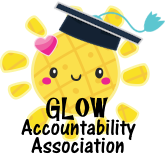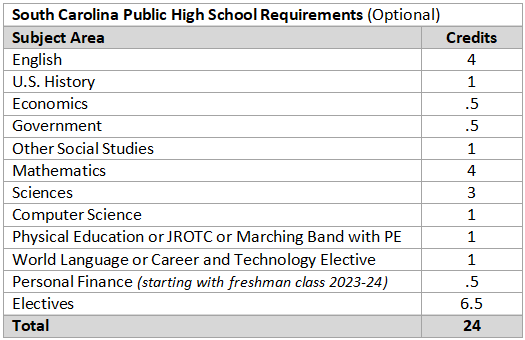

High School Requirements & Planning
What you do for high school depends on what you plan to do after high school. The option 3 homeschool requirements are the same for high school as in grades K-8. In addition to option 3 requirements many families choose to meet the requirements for a SC public school diploma or for college admission.

REQUIRED – SC Option 3 Homeshool Requirements
High school students are required to comply with all of the option 3 homeschool requirements.
For option 3 homeschool families, the primary parent/guardian is the homeschool administrator and is responsible for record-keeping, directing the student’s education, and grades. The parent determines their homeschool’s high school requirements and when the student has met those requirements for graduation.
OPTIONAL – SC Public School Requirements for SC Diploma
SC option 3 homeschoolers are not obligated to complete the public school diploma requirements to graduate from high school. Homeschoolers can still create a transcript, graduate, and receive a homeschool diploma.
Many students do choose to complete the the SC public school requirements, especially if they plan to go to college, technical school, military, or jobs that may ask for transcripts. Homeschool graduates receive a homeschool diploma. The official SC High School Diploma can only be issued by SC public high schools.
SC Dept of Ed public high school requirements


College note: 4-year colleges usually require Foreign Language: 2-3 credits in same language, and Electives: 1-2 of the credits in core subjects. Check the admissions page of colleges that interest your student.

Planning Courses for High School
There are many course options for homeschoolers. You can use homeschool curriculum, textbooks, online courses, in-person courses, or make your own course. Courses can look like traditional school or something different. You can use different learning methods while still covering the same overall content as a traditional class.
Start by talking about what your student wants to do after high school. Then find out what will be needed on the transcript to meet their goals. Check the admissions page of colleges and other programs that interest your student. Determine if you will include all of the SC public school required courses. Some colleges require more (or less) than the SC public schools require.
Make a list of all the courses you want do during high school. Plan each subject by year. Check for pre-requisite classes and plan accordingly. You should re-evaluate your high school plan at least once a year.
Units of Credit – Make sure you have enough course credits for college. Generally half year courses are 0.5 credit and full year courses are 1.0 credit. Many published and online curriculum also suggest the units of credit. Homeschoolers are able to do courses quicker or slower than schoolers. Some will do a full course in 1 semester, and some may take more time to do a challenging course.
7th – 8th Grade Courses for High School Credit – If your student takes a high school level course in 7th or 8th grade, it can go on the high school transcript.
Honors Courses have a higher weight in the SC GPA. Honors courses should be taken with a published curriculum or class that is specifically an honors curriculum. DIY honors courses are very hard to verify.
AP or Advanced Placement Courses – AP courses are college level courses approved by College Board and have the highest weight in the SC GPA. VirtualSC.org allows homeschool students to take AP courses.
VirtualSC.org is a free state sponsored online program that allows homeschool students to take high school courses including Honors and AP courses.
Dual Enrollment or Dual Credit Courses are classes that high school students take at a local college or online college. The student earns both high school and college credit for each course. The high school credits have the highest weight in the SC GPA.
Accredited High School Programs
Accredited programs are not a requirement for homeschoolers. We hear a lot about “accredited curriculum” which isn’t actually a real thing. Schools and programs are accredited. Curriculum is not. So for this homeschool discussion we will call them accredited programs.
Accreditation can mean different things depending on what entity is accrediting the program. Programs claiming to be accredited should show you what organizations have accredited them. Often it is an accrediting agency for private or independent schools. These usually have names associated with their location and accredit programs based on the local school or regional requirements.
You can go to the accrediting agency website to find more information about their accreditation requirements. Getting accreditation and keeping accreditation is not cheap so programs that are accredited tend to cost more.
Some programs have a specialized approvals. Advanced Placement (AP) courses would need approval by College Board and are generally available at public schools. NCAA approves programs on a course-by-course basis. NCAA approved courses can be very helpful if your child wants to play college sports. Some programs say that they meet the standards for things like military enlistment, certain learning methods, or educational style.
The mistake that some homeschoolers make is thinking that if they attend an “accredited” online school, they don’t need option 3 accountability. Only public & private schools registered with the South Carolina Department of Education can be attended without homeschool accountability.
There are a lot of criteria for choosing courses and curriculum other than accreditation. For example:
- You don’t want public school style courses.
- Special interests and talents
- Project-based courses
- Different learning methods like for dyslexia
- Teaching style
- Level of parental involvement
- Cost of curriculum or program
- Acceptance to a particular college or trade school
- Insert your criteria here…
Make sure you do your own research. Whether you choose a program that is accredited or choose your high school curriculum based on other merits, it is up to the homeschool family to determine their student’s personal high school goals and how that affects their next steps.
Record Keeping for High School
Record keeping is very important for high school. Your student will need a transcript as well as information about the content of each course.
Transcripts – You should create a high school transcript and update it for each year. The transcript needs to include:
- Course Title – Be descriptive. Algebra 2, Biology 1 with lab, American History, Spanish 3.
- Grade Level and School Year for each class.
- Units of Credit for each course – Usually 0.5 or 1.0 credit.
- Grade for course – Use percentage grades on the current SC grading scale of A=90-100.
- Course Type – CP=College Prep (regular course), H=Honors, AP=Adv Placement, D=Dual Enrollment (college course).
Also keep any transcript from traditional schools where a high school credit was earned or attempted in 7th-12th grade. Save a record of grades & credits for Dual Enrollment courses.
Course Records – Keep records for each course that appears on the transcript. Your may or may not need these in the future but it is easy to keep them now, hard to re-create them later. Currently SC public universities do not ask for course details. But some colleges in other states require more info and SC could change at any time. NCAA college sports eligibility requires very detailed course records. (See NCAA below.) It is a good idea to keep:
- Detailed syllabus for each course
- Title, edition, table of contents, publisher, and ISBN for textbooks
- Online course company name, course details, copy of syllabus (online access can disappear)
Also to Consider
High School Ranking – Do you need ranking? GLOW Accountability does not rank.
NCAA Eligibility for Student Athletes – The NCAA requirements for college sports eligibilty are very specific.
SAT & ACT Testing – When & how to take tests for college admissions.
Non-Academic Considerations for College and Job Resumes
Most students will apply to colleges or enter the work force after high school. Activities beyond academics can help with both. Planning for these each year can enrich the high school experience and help build college and work resumes.
- Community Service & Volunteering – many public high schools require service hours
- Extra Curricular Activities – Homeschool student can do extra curriculars too. It might not look like an after school club but there are many opportunities. These should be something the student does on a regular basis or for a long period of time. For example, theater, music, dance, martial arts, wood working, writing groups, book clubs, hobbies, scouts, 4-H, etc.
- Sports – All sports count as extra curricular activities if they are done regularly.
- Internships and jobs can enrich your student’s life experience as well as their resume.
- Awards, Certificates, Recognition – Keep all of these with a note about how it was earned.
What if Homeschooling High School isn’t Working?
Sometimes homeschooling high school just isn’t working. You’ve tried everything – different curriculum or learning methods, various motivation strategies, prayer… everything. That doesn’t mean you are a bad parent or your student is a failure at life. How can you guide them? Here are some options that real families have used.
Enroll in School – Some teens will do better in a school environment. It relies less on self starting and creating your own social life and it has more people and goals to be accountable to. Your student may see this as a more motivating option.
Carve your Own Homeschool Path – Do whatever it takes to keep your student “schooling” and on track for high school graduation. Loosen up on meeting the public school course requirements or college requirements. Find ways to do non-traditional high school courses that interest or motivate your child. Sometimes these students are entrepreneurs and independent thinkers. They may be frustrated by taking classes that have no forseeable usefulness. Focus on life skills, future career skills, and interest areas – whatever motivates them. Some of these can be categorized back into a traditional subject. For example: writing the church newsletter – English. If they are thinking forward to college, enroll them in dual enrollment courses online or have them go in person to the campus. They might not build the transcript you envisioned, but they graduate high school and are better prepared to make their way in the world.
GED and Adult Education – Once a student is 17 years old, they can opt out of school to earn a GED. Students who are age 17-18 will need a Verification Of Withdrawal form (VOW) signed by the last school attended. This may be your SC option 3 accountability association. People age 19 and older are eligible for GED without proof of withdrawal. Find out all about getting a GED in South Carolina here.
Age 17 and Opting Out – The day a South Carolina resident turns 17, they can opt out of school. Compulsory education applies to kids age 5 on Sept 1 until the day they turn 17 or graduate from high school as stated in the SC Code of Law 59-65.
